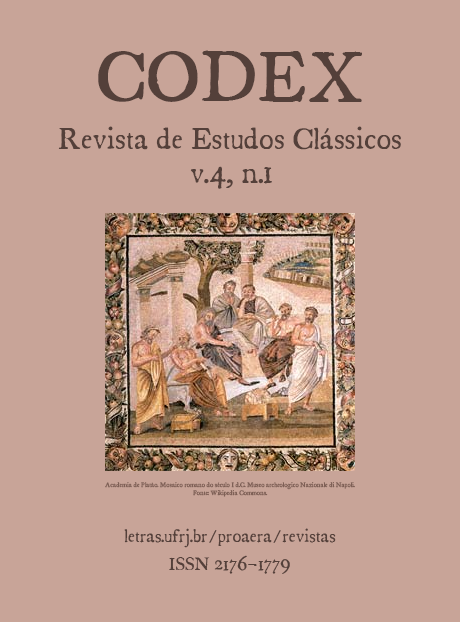O que há de tão ‘clássico' na recepção dos clássicos? Teorias, metodologias e perspectivas futuras
DOI:
https://doi.org/10.25187/codex.v4i1.3341Palavras-chave:
recepção dos clássicos, Electra, Cacoyannis, AngelopoulosResumo
Este trabalho apresentado na Universidade Federal do Rio de Janeiro em 3 de junho de 2015 busca explorar as diferentes abordagens sobre as questões mais fundamentais dos estudos de recepção dos clássicos. O que é a recepção dos clássicos? E, mais especificamente, o que há de tão ‘clássico' na recepção dos clássicos? O trabalho discute tendências correntes na teoria e metodologia através de uma análise de duas recepções cinematográficas da história antiga de Electra: uma que proclama sua dívida ao texto clássico, enquanto que a outra mascara suas conexões clássicas.
Downloads
Referências
BAKOGIANNI, A. Electra Ancient & Modern: Aspects of the Reception of the Tragic Heroine. London: Institute of Classical Studies, 2011.
BAKOGIANNI, A. “The Taming of a Tragic Heroine: Electra in Eighteenth-Century Art”. In: International Journal of the Classical Tradition 16.1 (March), 2009, pp. 19-57.
CACOYANNIS, M. “Discussion: Ancient Drama and the Film”. In: Symposium International á Delphes 18-22 Août 1981, le Théâtre Antique de nos Jours. Athens: Centre Culturel Européen de Delphes Athènes, 1984, pp. 211-28.
GADAMER, H-G. Truth and Method. New York: Continuum, 1960, 2. ed. 1965.
HALL, E. “Towards a Theory of Performance Reception”. In: HALL, E. and HARROP, S. (eds.) Theorising Performance: Greek Drama, Cultural History and Critical Practice. London: Duckworth, 2010, pp. 10-28.
HARDWICK, L. “From the Classical Tradition to Reception Studies”, In: Reception Studies, Greece & Rome, New Surveys in the Classics no. 33. Oxford: Oxford University Press, 2003, pp. 1-11. . “Fuzzy Connections: Classical Texts and Modern Poetry in English”, In: PARKER, J. and MATHEWS, T. (eds.). Tradition, Translation, Trauma: The Classic and the Modern. Oxford: Oxford University Press, 2011, pp 39-60.
HARDWICK, L. and STRAY, C. “Introduction: Making Connections”. In: A Companion to Classical Receptions. Malden, MA and Oxford: Blackwell Publishing, 2008, pp. 1-9.
HORNBLOWER, S. and SPAWFORTH, A. (eds.) The Oxford Classical Dictionary. Oxford: Oxford University Press, 2012, 4. ed., pp. 1256-57.
ISER, W. The Act of Reading: A Theory of Aesthetic Response. Baltimore and London: The Johns Hopkins University Press, 1978.
JAUSS, H. R. Towards an Aesthetic of Reception. Trans. T. Bahti. Minneapolis, WI: University of Minnesota Press, 1982.
KAHANE, A. “Methodological Approaches to Greek Tragedy”, In: ROISMAN, H. (ed.) The Encyclopedia of Greek Tragedy. Oxford and Malden, MA: Wiley- Blackwell, 2014, pp. 839-49.
KURTZ, D. “An Introduction to the Reception of Classical Art”. In: KURTZ, D. (ed), Reception of Classical Art: An Introduction, Studies in Classical Archaeology III. Oxford: Oxford University Press, 2004, pp. 31-45.
MARTINDALE, C. Redeeming the Text: Latin Poetry and the Hermeneutics of Reception. Cambridge: Cambridge University Press, 1993. MARTINDALE, C. “Introduction: Thinking Through Reception”, In: MARTINDALE, C. and THOMAS, R. F. (eds.). Classics and the Uses of Reception, 2006, pp. 1-13. “Reception – a New Humanism? Receptivity, Pedagogy, the Transhistorical”. Classical Receptions Journal 5.2, 2013, pp. 169-83.
MCDONALD, M. “A New Hope: Film as a Teaching Tool for Classics”, In: HARDWICK, L. and STRAY, C. (eds.). A Companion to Classical Receptions. Oxford and Malden. MA: Blackwell Publishing, 2008, pp. 327-41.
MICHELAKIS, P. Greek Tragedy on Screen. Oxford: Oxford University Press, 2013.
PAUL, J. “Working with Film: Theories and Methodologies”, In: HARDWICK, L. and STRAY, C. (eds). A Companion to Classical Receptions. Malden. MA and Oxford: Blackwell Publishing, 2008, pp. 303-14.
PORTER, J. I. “Reception Studies: Future Prospects”, In: HARDWICK, L. and STRAY, C. (eds). A Companion to Classical Receptions. Malden, MA, and Oxford: Blackwell Publishing, 2008, pp. 469-81.
Downloads
Publicado
Como Citar
Edição
Seção
Licença
Copyright (c) 2016 Anastasia Bakogianni

Este trabalho está licenciado sob uma licença Creative Commons Attribution-NonCommercial 4.0 International License.
A Codex - Revista de Estudos Clássicos utiliza uma licença Creative Commons - Atribuição-NãoComercial 4.0 Internacional.
Os autores dos trabalhos aprovados autorizam a revista a, após a publicação, ceder seu conteúdo para reprodução em indexadores de conteúdo, bibliotecas virtuais e similares.
A revista se permite o uso dos trabalhos publicados para fins não comerciais, incluindo o direito de enviar o trabalho para bases de dados de acesso público.










